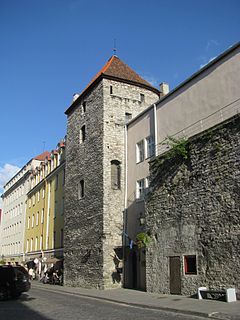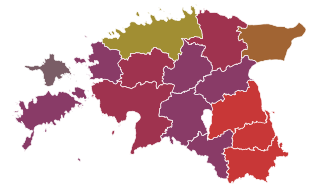
Astrid Kannel (born 7 June 1967 in Haapsalu) is an Estonian television journalist. [1] [2] [3] [4]

Astrid Kannel (born 7 June 1967 in Haapsalu) is an Estonian television journalist. [1] [2] [3] [4]
Astrid is a feminine given name of Scandinavian origin, a modern form of the name Ástríðr. Derived from the Old Norse Ássfriðr, a compound name composed of the elements áss and friðr.
Nordic folk music includes a number of traditions in Northern European, especially Scandinavian, countries. The Nordic countries are Iceland, Norway, Sweden, Denmark and Finland.

Gusli is the oldest East Slavic multi-string plucked instrument, belonging to the zither family, due to its strings being parallel to its resonance board. Its roots lie in Veliky Novgorod in Novgorodian Rus'. It may have a connection to the Byzantine form of the Greek kythare, which in turn derived from the ancient lyre, or might have been imported from Western and Central Europe during the Middle Ages, when the zither had immense popularity. It has its relatives in Europe and throughout the world: kantele in Finland, kannel in Estonia, kanklės in Lithuania, kokles in Latvia, Zither in Germany, citera in the Czech Republic, psalterium in France and so on... Furthermore, the kanun has been found in Arabic countries, and the autoharp, in the United States. It is also related to such ancient instruments as Chinese gu zheng, which has a thousand-year history, and its Japanese relative koto. A stringed musical instrument called guslim is listed as one of the Me in ancient Sumer.
Kannel may refer to:
Eesti Televisioon (ETV) is the free-to-air national public television station of Estonia. It made its first broadcast on 19 July 1955.

Kokle or historically kokles (kūkles) is a Latvian plucked string instrument (chordophone) belonging to the Baltic box zither family known as the Baltic psaltery along with Lithuanian kanklės, Estonian kannel, Finnish kantele, and Russian gusli. The first possible kokles related archaeological findings in the territory of modern Latvia are from the 13th century, while the first reliable written information about kokles playing comes from the beginning of the 17th century. The first known kokles tune was notated in 1891, but the first kokles recordings into gramophone records and movies were made in 1930s. Both kokles and kokles playing are included in the Latvian Culture Canon.
Estonia has recognised same-sex unions since January 1, 2016 by allowing same-sex couples to sign a cohabitation agreement, the first ex-Soviet state to do so.

Kannel is an Estonian plucked string instrument (chordophone) belonging to the Baltic box zither family known as the Baltic psaltery along with Finnish kantele, Latvian kokles, Lithuanian kanklės, and Russian gusli. The Estonian kannel has a variety of traditional tunings. In Estonia, studying the kannel has made a resurgence after some years of decline.

Eesti Rahvusringhääling (ERR) – Estonian Public Broadcasting – is a publicly funded radio and television organisation created in Estonia on 1 June 2007 to take over the functions of the formerly separate Eesti Raadio (ER) and Eesti Televisioon (ETV), under the terms of the Estonian National Broadcasting Act. The first chair of ERR is Margus Allikmaa, the former chair of Eesti Raadio. Present CEO is Erik Roose.

Birgit Sarrap, also known as simply Birgit, is an Estonian singer. Õigemeel rose to prominence in 2007 after winning the first season of Eesti otsib superstaari, the Estonian version of Idol. Her debut self-titled studio album was later released in 2008. Õigemeel has gone on to release four other studio albums in her career.

The Monumenta Estoniae Antiquae is an academic publication series of Estonian folklore, including folksongs in trochaic verse form (regilaul), legends, proverbs, riddles and folk tales.

Margus Lepa is an Estonian radio journalist and former actor.
Estonia participated in the Eurovision Song Contest 2012 in Baku, Azerbaijan. The Estonian entry was selected through Eesti Laul 2012, a national selection that consisted of two semifinals and a final, organised by the Estonian broadcaster ERR. Ott Lepland represented Estonia with the song "Kuula", which qualified from the second semi-final and went on to place 6th in the final, scoring 120 points.
Estonia participated in the Eurovision Song Contest 2013 in Malmö, Sweden. The Estonian entry was selected through the national selection "Eesti Laul 2013", organised by the Estonian broadcaster ERR. The song "Et uus saaks alguse", performed by Birgit and written by Mihkel Mattisen and Silvia Soro, represented the country and qualified from the first semi-final. The song went on to place 20th in the final, scoring 19 points.

Kristi Mühling is a professional Estonian chromatic kannel player who specialises mainly on classical and contemporary music. She has premiered numerous compositions for this instrument, both as a soloist and chamber musician. She is a member of regularly performing ensembles such as Resonabilis and Una Corda. Kristi Mühling is also the founder of the chromatic kannel specialty at the Estonian Academy of Music and Theatre and has worked there since the establishment of the specialty in 2002.

Estonian Theatre and Music Museum is a national museum located in the old town of Tallinn, Estonia. The museum was established in 1924.
Estonia participated in the Eurovision Song Contest 2016 with the song "Play" written by Fred Krieger, Stig Rästa and Vallo Kikas. The song was performed by Jüri Pootsmann. The Estonian broadcaster Eesti Rahvusringhääling (ERR) organised the national final Eesti Laul 2016 in order to select the Estonian entry for the 2016 contest in Stockholm, Sweden. The national final consisted of three shows: two semi-finals and a final. Ten songs competed in each semi-final and the top five from each semi-final as determined by a jury panel and public vote qualified to the final. In the final, the winner was selected over two rounds of voting. In the first round, a jury panel and a public vote selected the top three to qualify to the super final. In the super final, "Play" performed by Jüri Pootsmann was selected as the winner entirely by a public vote.
This is a list of Estonian television related events from 1967.
Astrid Lepa was an Estonian stage, television, voice, and film actress, screenwriter, and television director whose career began in the 1940s and ended shortly before her death, spanning over sixty years.

The COVID-19 pandemic in Estonia is part of the ongoing worldwide pandemic of coronavirus disease 2019 caused by severe acute respiratory syndrome coronavirus 2. The virus was confirmed to have spread to Estonia when the first case was confirmed in Tallinn on 27 February 2020. By 11 March, 15 people in Estonia had been diagnosed with the virus. All of them had been infected outside the country, mostly in Northern Italy. On 12 March, the first cases of locally transmitted infections emerged, and on 13 March, the Estonian government declared a state of emergency until 1 May 2020. As a result, all schools and universities were closed, and all public gatherings banned, including sports and cultural events. Later the state of emergency was extended until 17 May.